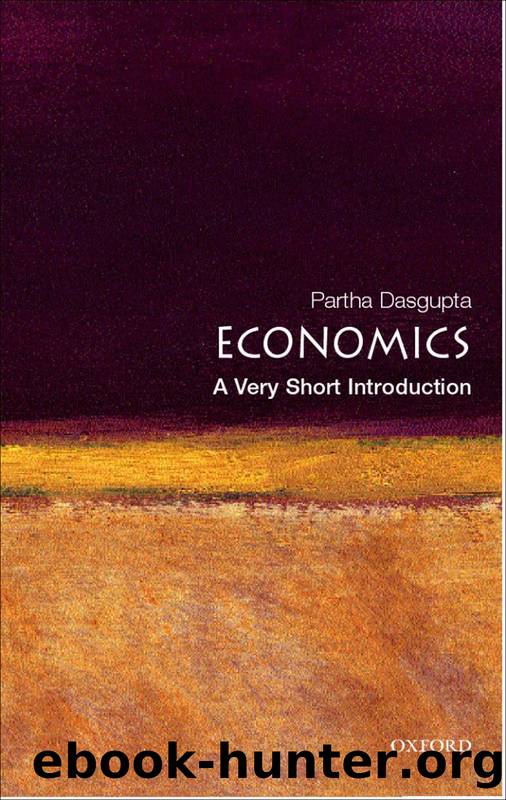Economics by Dasgupta Partha;

Author:Dasgupta, Partha;
Language: eng
Format: epub
Publisher: Oxford University Press, UK
Published: 2007-09-14T16:00:00+00:00
Monopoly
The second reason is that in some industries there is a single producer (monopoly) or at best only a few producers (oligopoly). Firms in an ideal market don’t have anything left over after every production input has been paid for (wages, salaries, raw materials, repair and maintenance, charges imputed to machinery and equipment, interest payments on loans, and so on). Because a monopolist doesn’t face competition from other firms, it’s able to charge a price higher than PE (Figure 8) and enjoy a profit.
Monopolists have a bad press in consequence. However, we need monopolists because profits from sales are the incentives firms must have if they are to spend resources in research and development (R&D), so as to create new products and invent cheaper ways of producing old products (which is a good thing). Moreover, monopolists try to maintain their leading position by engaging in R&D, thereby forestalling entry by rivals (a not-so-good thing). Unless they are curbed, though, monopolists would wish to more than just recoup those R&D expenses. In rich countries anti-trust laws have been legislated so as to prevent firms from doing that.
Monopolies are a necessary evil for another reason. There are commodities whose cost of production per unit produced declines with output. Economists call this phenomenon economies of scale.
Download
This site does not store any files on its server. We only index and link to content provided by other sites. Please contact the content providers to delete copyright contents if any and email us, we'll remove relevant links or contents immediately.
International Integration of the Brazilian Economy by Elias C. Grivoyannis(57324)
The Radium Girls by Kate Moore(10907)
Turbulence by E. J. Noyes(7039)
Nudge - Improving Decisions about Health, Wealth, and Happiness by Thaler Sunstein(6633)
The Black Swan by Nassim Nicholas Taleb(6192)
Pioneering Portfolio Management by David F. Swensen(5606)
Rich Dad Poor Dad by Robert T. Kiyosaki(5149)
Zero to One by Peter Thiel(4824)
Man-made Catastrophes and Risk Information Concealment by Dmitry Chernov & Didier Sornette(4736)
Secrecy World by Jake Bernstein(3782)
Millionaire: The Philanderer, Gambler, and Duelist Who Invented Modern Finance by Janet Gleeson(3569)
Skin in the Game by Nassim Nicholas Taleb(3461)
The Age of Surveillance Capitalism by Shoshana Zuboff(3423)
The Money Culture by Michael Lewis(3284)
Skin in the Game: Hidden Asymmetries in Daily Life by Nassim Nicholas Taleb(3264)
Bullshit Jobs by David Graeber(3180)
The Dhandho Investor by Mohnish Pabrai(3169)
The Wisdom of Finance by Mihir Desai(3079)
Blockchain Basics by Daniel Drescher(2891)
